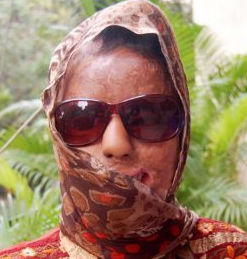 New Delhi, November 30: Four months ago, acid attack victim Sonali Mukherjee just wanted to die to escape her suffering.
New Delhi, November 30: Four months ago, acid attack victim Sonali Mukherjee just wanted to die to escape her suffering.
Now, the 27-year-old is a rupee millionaire after appearing on 'Kaun Banega Crorepati' and plans to use her experience to help combat the heinous crime of acid violence, which kills hundreds of people every year, most of them women.
"I've had 22 operations and nine more are remaining, so that at least my eyes and ears are functional," Mukherjee told the Times of India. "If I recover, I want to help people like me. In my nine years of struggle, I have faced a lot. I know the kind of difficulties we have to face, with no help from any quarter."
Nine years ago, three men broke into Mukherjee's home in the middle of the night as she slept and poured acid over her face - burning her skin, melting away her eyelids, nose, mouth and ears and leaving her partly deaf and blind - simply because she spurned their sexual advances.
Left with 70 percent burns and severe disfigurement, Mukherjee, who was a 17-year-old college student in the central Indian town of Dhanbad at the time, endured years of suffering, confined to her home. Her family could not afford the expensive reconstructive surgery she needed to help her live a normal life.
Her three attackers were released after serving three years in prison.
Unable to continue what she said was "half a life with half a face", Mukherjee begged the government to allow her to kill herself. Euthanasia is illegal in India.
MEDIA STAR
In the weeks that followed, Mukherjee's story made national headlines and there was an outpouring of public support for her. Local charities and private hospitals came forward offering to fund the surgery she needed.
The turning point came this weekend, when she was invited to appear as a contestant on the Indian quiz show " Kaun Banega Crorepati" hosted by popular Bollywood star Amitabh Bachchan, also known as Big B. "I could never imagine that I would meet big people. Meeting Big B was the best thing. He is such a big star, but is so humble and down-to-earth," she said.
Wearing sunglasses and with a red scarf wrapped round her head and partly covering her face, she was guided onto the stage by Bachchan and former Miss Universe Lara Dutta, and given a standing ovation by the audience.
Confidently answering questions on everything from botany and cooking to political history, the young woman scooped 2.5 million rupees with her celebrity partner Dutta.
Mukherjee plans to use her winnings to complete her surgery, but says this is not the end of her struggle. With her new-found celebrity status, she wants to speak out against acid violence, most common in countries such as Cambodia, Bangladesh, Pakistan, Afghanistan and India, where social structures remain deeply patriarchal.
Around 1,500 acid attacks are reported globally each year, 80 percent of them on women, says the London-based charity Acid Survivors Trust International, though it also says this is a gross under-estimate as most victims are scared to speak out.
"I appeal to the government to ensure that these cases are not repeated," said Mukherjee. "Make a separate law, which is not just on paper, but is followed," she said.






Comments
Add new comment